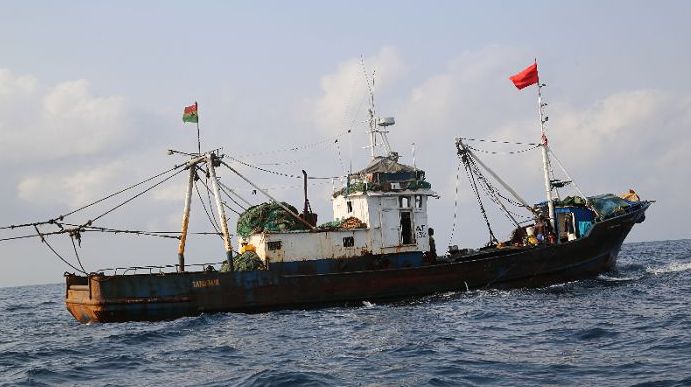
End illegal transshipment of fish on Ghanaian waters
The Central Region branch of the Ghana National Canoe Fishermen Council (GNCFC) has called on the government to take urgent steps to end the illegal transshipment of fish from Ghanaian waters.
They said increasing activities of trawlers in Ghanaian waters and illegal transshipment activities, popularly called “Saiko” was continuously depriving many artisanal fishermen and others involved in the artisanal fishing sector of their livelihoods and making them poorer.
Industrial trawlers
Speaking at a press conference at Anomabo yesterday, a spokesperson for the fishermen and an executive member of GNCFC, Nana Kweigyah, said though the government made a specific statement on stopping Saiko in the 2020 budget, it was obvious that very little had been done practically to fight the menace.
Nana Kwegigyah, flanked by other fishermen who wore red bands, stated that the extent of damage by the industrial trawlers to marine environment and resources and the negative impact on the livelihood of many in coastal communities should be a great source of worry and reason for urgent action.
“In the 2020 budget on paragraph 718, the government made a specific statement of stopping Saiko, but we have not witnessed that. We are by this press conference calling on the highest office of the land, the Presidency, and the government to live by their words by stopping Saiko.”
He said ending Saiko permanently would protect the livelihood of Ghanaians.
Nana Kweigyah said Ghana’s artisanal fishing was under serious threat and on the verge of collapse due to the practice of Saiko by industrial trawlers.
Saiko
The industrial trawlers target the staple catch of artisanal fishers, harvest them and freeze them into pallets of fish and sell to agents at high seas, who in turn sell to the fishing communities for profits. Meanwhile, these fishes are the sole preserve of the artisanal fishers by law.
“As we speak, we are in our major season of bumper harvest but there is very little or no catch in many fishing communities.
Saiko is a threat to the livelihood of over 2.7 million Ghanaians, including 140,000 fishermen along with thousands of fishmongers, majority of whom are women, traders, canoe carvers, input suppliers and fish carriers as well as their dependents,” he stated, adding that these constituted 10 per cent of the nation’s population.
Food security
Nana Kweigyah said Saiko remained a threat to food security and nutrition, jobs, income security and national security.
“Saiko has been found to be a severely destructive form of illegal fishing, which in addition to driving the decline in marine fish stock, destroy the marine environment and erodes the potential of marine resources to rebuild. This phenomenon has contributed to the decline and near collapse of the small pelagic stocks such as sardinella, chub mackerel and anchovies,” he observed.
According to him, Saiko consignments were still being landed at ports in Elmina, Apam and Axim in spite of the fact that the trade was illegal, stressing that both the Fisheries Act, 2002 (Act 625) section 132 and the Fisheries Regulations, 2010, regulation 33, explicitly prohibited Saiko.
Artisanal fisherman
A chief fisherman at Anomabo, Nana Kojo Bonfir V, for his part, said the impact of the activities of the industrial vessels had affected the artisanal fishermen and the coastal communities significantly leaving them poorer.
“What is happening in our waters is worrying. We expect action from the authorities to save the artisanal fishing industry urgently,” he added and called for pragmatic efforts to curb the Saiko menace.
Background
A recent study conducted by some non-governmental organisations (NGOs) in the fisheries sector, with funding from the Environmental Justice Foundation (EJF), concluded that the Saiko illegal fishing activity by some foreign vessels in the country's marine territory was denying the state more than $50.7 million annually.
The activities, which border on catching small fishes and selling them at sea at ridiculous prices to canoe fishermen, are also contributing to dwindling fish stock and catches which have plagued the local fishing industry for the last 10 to 15 years.
The illegal activities of the industrial vessels have led to a drop in the income of artisanal fishermen by as much as 40 per cent in the last decade.
